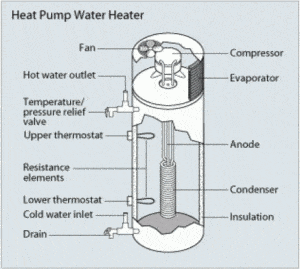Heat Pump Water Heaters in San Diego
In San Diego, do you require a new water heater? If so, think about switching to a heat pump water heater. The majority of homeowners use heat pumps to heat and cool their homes. However, a heat pump can also be used to heat water, either on its own or in conjunction with a system that also provides air conditioning.
How They Operate
HVAC unit Instead of directly producing heat, water heaters use energy to transfer heat from one location to another. They can consequently save two to three times as much energy as traditional electric resistance water heaters. A refrigerator moves heat by acting as a heat pump in reverse.
A stand-alone air-source heat pump water heater gathers heat from the surrounding air and transfers it — at a higher temperature — to heat water in a storage tank, much how a refrigerator extracts heat from inside a box and distributes it into the area around it. An integrated stand-alone heat pump water heating system that includes a built-in water storage tank and backup resistance heating components is available for purchase. Additionally, a heat pump can be made to work with an existing conventional storage water heater.
Heat pump water heaters need to be installed year-round at temperatures between 40°F and 90°F (4.4°C and 32.2°C) and be built with at least 1,000 cubic feet (28.3 cubic meters) of space around them. The air that flows through the evaporator can be exhausted either through the chamber or from the outside.
Heat pump water heaters are useless in cold areas because they cool the area in which they are installed. Installing them in a room with a lot of heat, such as a furnace room, will make them work more efficiently.
An air-source heat pump system that combines heating, cooling, and water heating can also be installed. In the summer and the winter, these combination systems take heat from the internal air. Because it draws heat from the air, any sort of air-source heat pump system works better in a hot region.
Homeowners commonly utilize geothermal heat pumps to heat and cool their houses. These devices extract heat from the earth in the winter and from inside air in the summer. A desuperheater for water heating can be installed to a geothermal heat pump system. A desuperheater is a compact heat exchanger that heats water by using superheated gases from the heat pump’s compressor. A pipe transporting the hot water then connects to the home’s storage water heater tank.
Desuperheaters are an additional choice for tankless or demand-type water heaters. The desuperheater makes use of the extra heat that would often be released to the ground during the summer. The geothermal heat pump may be able to supply the majority of your hot water needs if you frequently use it throughout the summer.
When the desuperheater isn’t producing as much excess heat in the fall, winter, and spring, you’ll need to rely more on your storage or demand water heater. Geothermal heat pump systems with three functions—heating, cooling, and hot water—are also offered by some manufacturers. To supply all of a household’s hot water needs, they use a separate heat exchanger.
How to Choose a Heat Pump Heater for Water
Heat pump water heaters frequently start out more expensive than conventional storage water heaters. However, their lower operating expenses can make up for their higher purchase and installation prices.
You should also think about the following things before purchasing a heat pump water heating system:
- Size and rating for the first hour -Fuel kind and availability
- Overall expenses -Energy efficiency (energy factor)
See our information on air-source heat pumps and geothermal heat pumps if you’re thinking about installing an integrated water heating, space heating, and cooling heat pump system in your house.
Maintenance and Installation
With correct installation and upkeep, your heat pump water heating system’s energy efficiency can be increased.
The right installation depends on a variety of criteria. Among these factors are the type of fuel, the environment, the demands of the local building codes, and safety issues. Therefore, it is advised to hire a licensed plumbing and heating contractor (or a geothermal heat pump system installer/designer) to install your heat pump.
When looking for a qualified specialist, keep the following in mind:
- Ask for written cost estimates
- Ask for references
- Check the company with your local Better Business Bureau
- Confirm that the company will seek a local permit if necessary and is familiar with local building codes.
Periodic water heater maintenance can considerably extend the life of your water heater and reduce efficiency loss. Specific maintenance advice can be found in your owner’s manual.
Increasing the effectiveness of energy use
After your water heater has been properly built and maintained, try some additional energy-saving techniques to help reduce your water heating costs. It is more cost-effective to install various energy-saving devices and systems along with the water heater. For all of your plumbing and leak detection needs, call Home Pro Plumbing.
Source: https://www.energy.gov/energysaver/heat-pump-water-heaters
Reach out to our plumbing service experts today!
We are fully committed to providing you with the plumbing services that you need in San Diego.

